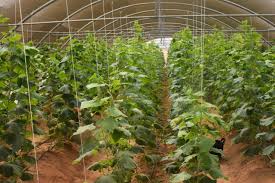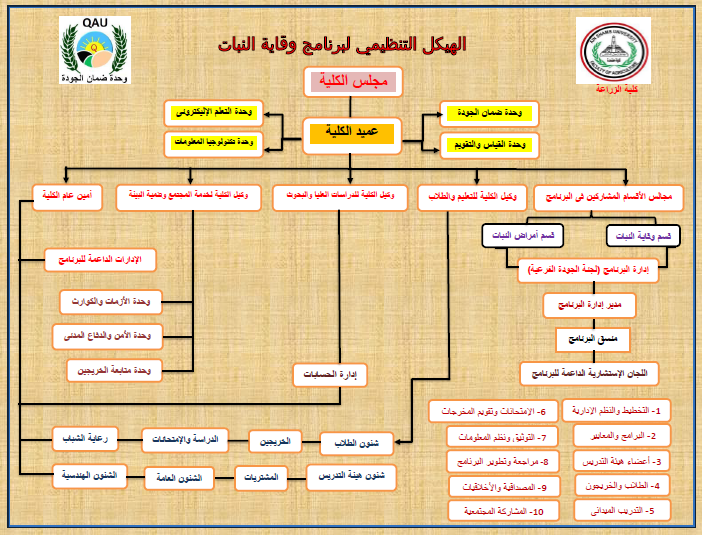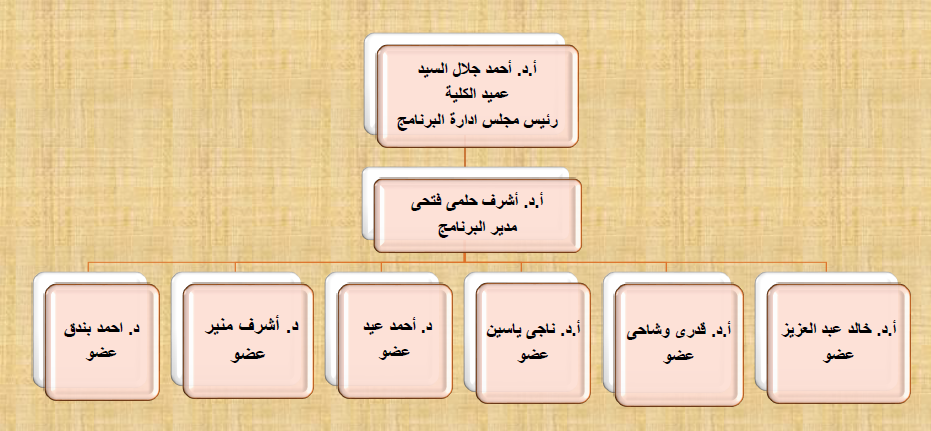
Vision
We look forward to the graduates of the program being scientifically distinguished and skillful, by achieving effective progress in the management of sustainable plant pest and disease problems on local and regional levels.
Mission
Providing high-quality education to prepare distinguished graduates with academic and applied knowledge of prevention sciences and plant health, and developing students' skills to be able to apply integrated management programs of crop pests and to keep up with current and future developments, and are qualified to invest in opportunities of success on the local and regional level.
Program Objectives
1. Preparing a highly qualified graduate in the integrated management of plant pests and diseases, who is able to design and implement control programs, taking into account the safety of the environment and food.
2. Developing the graduate's capabilities in using modern technologies in plant protection.
3. Developing the spirit of research, innovation, and continuing education for graduates of the Plant Protection Program.
4. Filling the needs of the local and regional market for specialists and competencies in the field of plant protection.
5. Establishing a partnership between the program and agricultural institutions and companies in Egypt to train and employ program graduates.
6. Developing the graduate's ability to establish a small project in the field of plant protection.


Fields of work for a program graduate
1- Research institutes and stations affiliated with the Ministry of Agriculture.
2 - Local and international private agricultural companies.
3- Farms and greenhouses of individuals or companies.
4- Managing agricultural investment projects.
5- Management of the Agricultural Consultation Office.
6- Work in the quantitative multiplication laboratory for biological control agents.
7 - Establishing and managing apiaries and breeding silkworms.
8 - Pest control in the field and preparation of various control programs.
9 - Work in pesticide factories.
11 - Work in laboratories for the analysis of pesticide residues.
11- Work in the trade of pesticides.
12 - Work on the agricultural quarantine project at airports and ports.
13 - Work on the brown rot project of the Ministry of Agriculture to combat potato diseases.
14 - Work in public health pest control companies.
Specifications of a program graduate
1- Demonstrate knowledge and awareness of the role of the agricultural engineer in society.
2 – Department and employment of agricultural resources.
3 - Department of agricultural establishments.
4- The ability to use appropriate technology to solve technical and economic problems in the field
agricultural field.
5- Demonstrate his professional ability well.
6- Preserving natural resources and biological diversity.
7- Demonstrate awareness of legal, ethical, and social issues related to agriculture.
8- Demonstrate his ability to develop his performance, and is qualified for continuous and self-learning.
9- Enroll in graduate studies programs and work in the research field.
11 - Use appropriate control methods to control pests, avoiding what harms the environment.
11- Develop strategic plans to prevent the spread of pests.
12- Planning and implementing the integrated pest management program.
13- Keeping the pest below the level of the economic limit of damage.
14 - Evaluate the risks of pesticides to non-target organisms.
Academic advisor:
A faculty member selected by the program department subcommittee to guide and assist students in solving problems, which he may be exposed to during the study, and his opinion is advisory.
Academic Advising Aims:
1- Providing the necessary support to the student during his academic career in order to achieve the flow of the study plan and to complete the requirements of the study plan for the program the student is enrolled in within the prescribed time period.
2- Supervising and following up on the implementation of the procedures and instructions of academic advising in the faculty.
3- Realizing the importance of advising and its role in providing the university academic climate and explaining the study plan and its vocabulary.
4- Providing career guidance to the student during his educational career and beyond, in order to achieve suitable job opportunities his specialization, and his social and financial status.
5 - Providing material support, if possible, and moral support for students during their educational journey in faculty.
The duties of the academic advisor are as follows:
1- Each academic advisor supervises a group of students.
2 - Assisting the student in achieving the required skills and the targeted educational outcomes for graduates of the program.
3- Providing advice and assistance in finding solutions to the problems and difficulties they face inside or outside the university campus, by introducing them to university traditions and regulations, which directly affect their academic performance.
4- Be an observer and supervisor of their choices without obliging them to follow the instructions and directives dictated to them towards what suits them, monitor their choices, and intervene with assistance and advice when needed without waiting or asking for help from the student.
5 - Develop a study plan for the student within the limits of his capabilities.
6- Clarifying the extent of the student’s progress according to the study plan through a specialization card for each student in which he records all his data and the results that he obtained.


.svg)